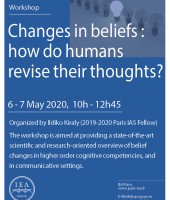Changes in beliefs: how do humans revise their thoughts?
E-workshop organized by Ildiko Kiraly, 2019-2020 Paris IAS Fellow.
This e-workshop is freely accessible, a link will be sent to you by e-mail a few days before the event. Please register using the form below.
Our environment is constantly and rapidly changing, and flexibly adapting to these changes poses a fundamental challenge to human, and possibly non-human, intelligence. Change is important not only at the scale of cognitive computations in the individual, or in our everyday cognition, but also in scientific theory formation. However, despite the ubiquitous occurrence of this phenomenon, we lack the scientific knowledge on how change – specifically fast updating or revision of representations –takes place in individual thought.
How do we revise our thoughts? What type of processes promote fine tuning of concepts and thus make humans flexible learners? Can we investigate cognitive procedures beyond model changes and knowledge enrichment? While humans are obsessed with thinking of and analyzing themselves and others, most investigation has gone into single-track computations focusing on the outputs of perceptual and cognitive processes. As a consequence, we lack studies that can grasp how modifications and adaptations are achieved. In order to understand ourselves, and to better understand others in interactions, a description of how updating and change is happening in our concepts and beliefs is needed. So, to better understand the continuously changing world, there is a need for research targeting how updating and strategic change take place at the level of cognitive processes.
This collection of papers is aimed at providing a state-of-the-art scientific and research-oriented overview of belief changes in higher order cognitive competencies, and in communicative settings. With contributions from cognitive and developmental psychology, comparative cognition, philosophy, and linguistics, we aim to offer a new angle on how dynamic development and resilience, a crucial competence in service of the flexibility of mental activities and thinking, is attained.
Program
MAY 6
CHANGES IN PERSPECTIVES, BELIEFS AND MEMORIES
10.00-10.30
Yana Fandakova, MPI Berlin
Memory and metamemory development in childhood
10.30-11.00
Dora Kampis, University of Copenhagen
The shift from generic to specific encoding in human infants: bootstrapping via contrasting perspectives
11.00-11.30
Christopher Nicholas Krupenye, University of Durham
Perspective-taking and Updating by Great Apes
Break
11.45-12.15
Ildikó Király, IEA Paris and Eötvös Loránd University Budapest
‘I have changed my mind’: the interplay of memory and theory of mind
12.15-12.45
Andreas Falck, Lund University and Jean Nicod Institute Paris
Sharing information and differentiating beliefs: the role of social attention in false-belief tasks
MAY 7
CHANGES IN TRUST AND ORGANIZATION OF INFORMATION
10.00-10.30
Ágnes Kovács, CEU, Budapest
Belief fixation, update and revision in infants and adults
10.30-11.00
Pierre Jacob, ENS Paris
Interactive and non-interactive belief updating
11.00-11.30
Olivier Mascaro, CNRS Paris
The early of ontogeny of presumptions of competence, and their role in belief update
Break
11.45-12.15
Dan Sperber, CEU
Trusting the source, accepting the argument: Two ways to change one's beliefs
12.15-12.45
Judit Gervain, Paris Descartes, CRNS
Extracting abstract regularities from language: a developmental scenario of information updating


